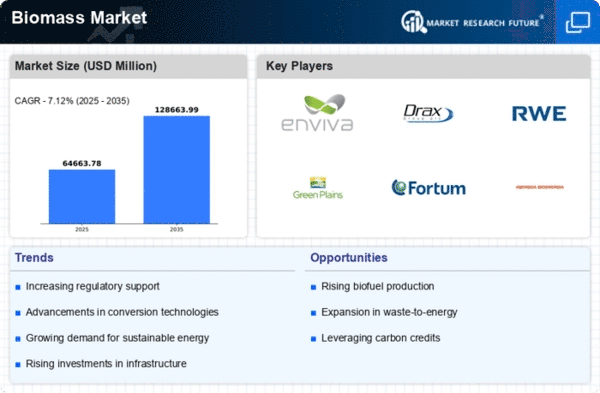Market Trends
Key Emerging Trends in the Biomass Market
The Biomass market is experiencing dynamic trends driven by the growing emphasis on renewable energy sources, sustainability initiatives, and technological advancements in biomass conversion technologies. Biomass, derived from organic materials such as wood, agricultural residues, and municipal solid waste, is increasingly being utilized as a renewable energy source to reduce greenhouse gas emissions and mitigate climate change. One notable trend in the Biomass market is the increasing adoption of biomass-based power generation, particularly in regions striving to meet renewable energy targets and reduce dependence on fossil fuels. Biomass power plants utilize various feedstocks to produce electricity through processes such as combustion, gasification, and anaerobic digestion, offering a reliable and environmentally friendly alternative to coal-fired power plants.
Moreover, the Biomass market is witnessing significant growth in the biofuels sector, driven by government mandates, incentives, and the growing demand for cleaner transportation fuels. Biofuels such as ethanol and biodiesel, derived from biomass feedstocks such as corn, sugarcane, and soybean oil, are increasingly being blended with conventional fuels to reduce emissions and enhance energy security. With advancements in biofuel production technologies and the development of next-generation feedstocks such as algae and cellulosic biomass, the biofuels market is poised for further expansion, offering sustainable alternatives to petroleum-based fuels.
Another key trend in the Biomass market is the increasing use of biomass for heat and thermal applications, particularly in residential, commercial, and industrial sectors. Biomass boilers and furnaces are capable of efficiently converting biomass feedstocks into heat for space heating, water heating, and industrial processes, offering cost savings and environmental benefits compared to traditional fossil fuel heating systems. As concerns about air quality and carbon emissions continue to rise, biomass heating solutions are gaining traction as a clean and renewable alternative to heating oil, natural gas, and coal.
Furthermore, the Biomass market is witnessing growing interest in biobased products and materials derived from biomass feedstocks. Biomass can be converted into various biobased products such as bioplastics, biochemicals, and biocomposites, offering sustainable alternatives to conventional petroleum-based materials. With increasing consumer awareness and regulatory pressure to reduce plastic waste and dependence on fossil resources, the market for biobased products is poised for significant growth, driving innovation and investment in biomass conversion technologies and biorefineries.
The Biomass market is also influenced by broader economic and policy factors, including government incentives, renewable energy targets, and carbon pricing mechanisms. Policies such as renewable energy mandates, feed-in tariffs, and tax credits incentivize investment in biomass projects and create favorable market conditions for biomass producers and suppliers. Additionally, carbon pricing mechanisms such as carbon taxes and emissions trading schemes provide economic incentives for reducing greenhouse gas emissions and encourage the use of renewable energy sources like biomass.
The COVID-19 pandemic has also impacted the Biomass market, causing disruptions in supply chains, project financing, and demand for biomass products and services. However, the crisis has underscored the importance of resilience and sustainability in energy systems, driving greater interest in renewable energy sources like biomass as a means of building more resilient and sustainable economies.


















Leave a Comment